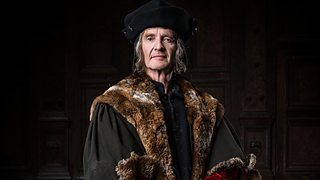No More, Mr Nice Guy?
By MICHAEL CAINES
Here’s one corollary of that well-worn maxim about victors writing history: historians love a villain. And, you might add, so do novelists. For example: out of her memories of a Catholic schooling at Harrytown Convent near Stockport in Cheshire, Hilary Mantel has taken the sainted image of Thomas More (he was canonized in 1935) and turned him into the arrogant, fundamentalist, torture-condoning prig of Wolf Hall. A Man for All Seasons, as many have noted, this is not. Is it fair to make More so foul?
I've been dawdling around the middle ground between history and fiction recently, trying to size up the "real" More from a biographical angle, so I’m finding it interesting to see not only how he appears in the BBC2 adaptation of Wolf Hall (the third episode of which airs tonight), but also how this fictional More has alarmed those with some expertise on the historical subject – in the same way that the abysmal Anonymous caused consternation among Shakespeare scholars, or Becoming Jane bemused some Austenites. These were cinematic fictions, yes, but they derived from facts; the fear was that they would lead others to think that they had some claim on the exciting, secret truth of the matter.
At least, that seems to be one justification for rising up and whinging about the Hollywood version of history. The assumption seems to be that cinema-goers are wonderfully suggestible, as must be viewers of Wolf Hall. (And readers of the novel? Here's my review from 2009.) If that's true, they have learnt by now that Thomas More (played with bedraggled pomp by Anton Lesser) was just some grandee with a nice line in schoolteacherly hypocrisy. “Oh, I think it’s a little late to read the Cardinal a lesson in humility”, he can intone of Cardinal Wolsey, as that churchman falls from favour and More, the lawyer, rises.
To Thomas Cromwell (played by Mark Rylance), this is good coming from More, lording it over a politicos’ dinner party (Cromwell has to number among them to engage in this conversation at all, of course, but don’t worry, he arrives late and sits at the far end of the table). More boasts of his piety, but here he is usurping Wolsey’s position as Lord Chancellor. “What’s that, a fucking accident?”, Cromwell asks, prompting More to exit in a curmudgeonly grump. This is a far cry from the quick wit whose company the King supposedly enjoyed so much that More could barely excuse himself to go home and see his family.
Something tells me this television serial may be an attempt to create a costume drama out of a less-than-telegenic crisis. While Henry VIII (played by Damien Lewis) strides purposefully through rooms of lackeys or stands with arms akimbo to correspond with our imaginary portraits of him, a few loyal subjects are presumably just out of shot hacking out the terms of a trade agreement with Charles of Castile, or counting the Church revenues over which Cromwell and Anne Boleyn are to disagree. More himself complained about not seeing enough of his family thanks not just to a good stock of witticisms but the arduous hours the administration of the King’s affairs compelled him to keep. And no doubt there would be some difficulty in conveying over dinner, in Peter Straughan’s dialogue, that the hair-shirt More was wearing under his finer robes was itching somewhat.
I guess More’s big moment on the box/block is still to come, as his own fall from power approaches. Yet it’s striking to see how, of all the wrong notes to pick out, it’s perhaps this – the Mantel version of a man dubiously accorded the honour, in 2000, of being appointed Rome’s patron saint of politicians – that has already caused the most fervent outcry. David Starkey has had his cake (Wolf Hall is a “wonderful, magnificent fiction . . .”) and eaten it (it is “based on a deliberate perversion of fact”); Jonathan Jones has eloquently summarized the defence against the Mantel “caricature”; and two Catholic bishops have made their opinions known, too, apparently unaware that they are simply inviting undercutting remarks along classic Mandy Rice-Davies lines, that – well, they would say that, wouldn’t they?
More’s legacy has always been a doubtful and controversial one, from the time of his execution, through Shakespeare’s use of his Richard III (More knew what it was like to be a historian in search of a villain), to the socialist acclaim for Utopia, and down to our own revisionist accounts, in which he may appear to be, in the words of Jasper Ridley, “a particularly nasty sado-masochistic pervert”. Some believe Mantel has made a villain of a hero, or even stolen some of More’s thunder and given it to her own protagonist, Thomas Cromwell (you could write a whole book, and indeed John Guy has, about the mutual adoration of More and his daughter Margaret; here it is Cromwell who is kind to animals, a man of strong family feeling etc).
"It is not a battle between history and fiction", Diarmaid MacCulloch has said, "It is a conversation." (Do Professor MacCulloch's fellow conversationalists know that?) Or to put it another way: the current counter-movement to Wolf Hall is just the latest variation on a sometimes acrimonious and oft-aired theme. What next for the humanist scholar who seems to have played so many roles in his own life – lawyer, London undersheriff, family man, pursuer of heretics, Lord Chancellor, martyr – what role will be thrust on him next?
Peter Stothard's Blog
- Peter Stothard's profile
- 30 followers




